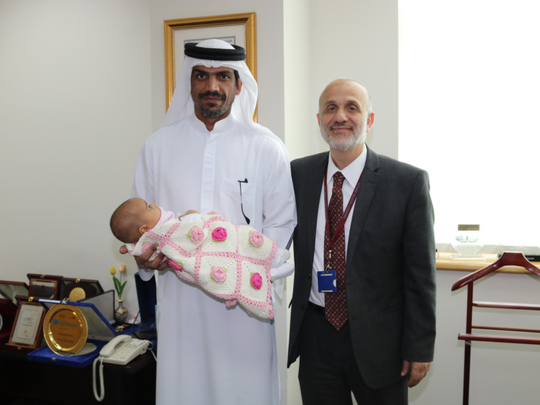
Sharjah: A three-week-old Emirati baby girl whose skin turned blue due to a life-threatening chest infection has been discharged from a Sharjah hospital.
When the baby, Ghaya, was brought to the emergency department of University Hospital Sharjah, she showed signs of infection.
Her father, Mohammad Ali, said “the symptoms included high fever and persistent cough”.
After conducting several tests, a severe chest infection was diagnosed. The infant was taken to Neonatal Intensive Care Unit for continued care.
The UHS team of paediatric staff found that the infant was in continuous coughing fits and had interrupted breathing patterns.
Ghaya’s skin had become blue, which indicates low saturation of oxygen in the body.
Whooping cough
The team immediately provided oxygen and assisted the baby’s breathing to prevent any further discolouration.
Five days later, the results from UHS’s laboratory came back positive for whooping cough.
Since the baby was only three-weeks old, it was crucial to discover the source of the disease and the mother was also coughing.
“The mother had contracted whooping cough which was then passed onto Ghaya,” said Hakam Yaseen, UHS’s Medical Director.
“There is a high mortality rate in these cases, especially if the baby is a newborn. Without assistance, the disease would eventually affect and stop the baby’s heart.”
Antibiotics were used to clear her pharynx, the membrane-lined cavity behind the mouth, of bacteria but the toxins will continue for six to eight weeks.
After being admitted and monitored for 25 days to allow time to heal, the baby was discharged without a cough.
These cases are rare in the region. Authorities recommend vaccination for pregnant women as a safety precaution.












